War_Conflict
Latest Stories
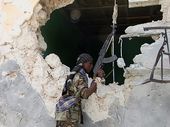
somali_7000
An Islamist fighter take position during clashes with Somali government soldier and African union peacekeepers in southern Mogadishu's Hodon neighborhood, Somalia, Monday Oct. 4, 2010. Ali Muse, the head of Mogadishu's ambulance service, says a spike in violence the last three days in Mogadishu has killed at least 20 civilians. More than 70 people have been wounded.(AP Photo/Farah Abdi Warsameh)
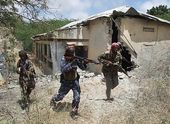
somali_6999
Islamist fighters take positions during clashes with Somali government soldier and African union peacekeepers in southern Mogadishu's Hodon neighborhood, Somalia, Monday Oct. 4, 2010. Ali Muse, the head of Mogadishu's ambulance service, says a spike in violence the last three days in Mogadishu has killed at least 20 civilians. More than 70 people have been wounded. (AP Photo/Farah Abdi Warsameh)
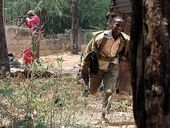
somali_6998
Islamist fighters take positions during clashes with Somali government soldier and African union peacekeepers in southern Mogadishu's Hodon neighborhood, Somalia, Monday, Oct. 4, 2010. Ali Muse, the head of Mogadishu's ambulance service, says a spike in violence the last three days in Mogadishu has killed at least 20 civilians. More than 70 people have been wounded.(AP Photo/Farah Abdi Warsameh)
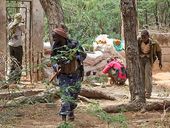
somali_6997
Islamist fighters take positions during clashes with Somali government soldier and African union peacekeepers in southern Mogadishu's Hodon neighborhood, Somalia, Monday, Oct. 4, 2010. Ali Muse, the head of Mogadishu's ambulance service, says a spike in violence the last three days in Mogadishu has killed at least 20 civilians. More than 70 people have been wounded.(AP Photo/Farah Abdi Warsameh)
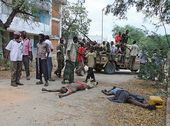
somali_6996
Al-Shabab militants gather near the bodies of Somali government soldiers who were killed during clashes with Islamists in southern Mogadishu's Hodon neighborhood , Somalia, Monday, Oct.4, 2010. Ali Muse, the head of Mogadishu's ambulance service, says a spike in violence the last three days in Mogadishu has killed at least 20 civilians. More than 70 people have been wounded.(AP Photo/Farah Abdi Warsameh)
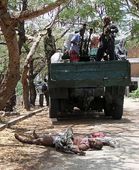
somali_6995
Al-Shabab militants stand of the back of a truck with an anti aircraft gun mounted on the back near the body of Somali government soldier who was killed during clashes with Islamists in southern Mogadishu's Hodon neighborhood , Somalia, Monday Oct.4, 2010. Ali Muse, the head of Mogadishu's ambulance service, says a spike in violence the last three days in Mogadishu has killed at least 20 civilians. More than 70 people have been wounded.(AP Photo/Farah Abdi Warsameh)

mosque_6988
A Palestinian child holds a charred Quran, a Muslim holy book, inside a mosque in the West Bank village of Beit Fajjar, near Bethlehem, Monday Oct. 4, 2010. Arsonists torched a mosque in a Palestinian village in the West Bank on Monday, scrawling "revenge" on a wall in Hebrew and charring copies of the Muslim holy book in a blaze that threatened to stoke new tensions over deadlocked Mideast peacemaking. (AP Photo/Bernat Armangue)

mosque_6987
A Palestinian prays in the torched and vandalized Prophet's Mosque in Beit Fajjar, north of Hebron in the West Bank, October 4, 2010, 2010. Palestinian sources said that Jewish settlers entered the mosque and torched the mosque, Koran books, prayer rugs and left Hebrew graffiti with slogans against Arabs, Muslims and Mohammad on the walls. UPI/Debbie Hill

mosque_6986
Palestinian police stand by a box of burned Koran books in the torched and vandalized Prophet's Mosque in Beit Fajjar, north of Hebron in the West Bank, October 4, 2010, 2010. Palestinian sources said that Jewish settlers entered the mosque and torched the mosque, Koran books, prayer rugs and left Hebrew graffiti with slogans against Arabs, Muslims and Mohammad on the walls. UPI/Debbie Hill

mosque_6985
Palestinians look at Hebrew graffiti, that reads 'Revenge', in the torched and vandalized Prophet's Mosque in Beit Fajjar, north of Hebron in the West Bank, October 4, 2010, 2010. Palestinian sources said that Jewish settlers entered the mosque and torched the mosque, Koran books, prayer rugs and left Hebrew graffiti with slogans against Arabs, Muslims and Mohammad on the walls. UPI/Debbie Hill

mosque_6984
Palestinians look at Hebrew graffiti, that reads 'Mosque toilet 18', with a Star of David in the torched and vandalized Prophet's Mosque in Beit Fajjar, north of Hebron in the West Bank, October 4, 2010, 2010. Palestinian sources said that Jewish settlers entered the mosque and torched the mosque, Koran books, prayer rugs and left Hebrew graffiti with slogans against Arabs, Muslims and Mohammad on the walls. UPI/Debbie Hill

mosque_6983
Palestinian police carry a box of burned Koran books in the torched and vandalized Prophet's Mosque in Beit Fajjar, north of Hebron in the West Bank, October 4, 2010, 2010. Palestinian sources said that Jewish settlers entered the mosque and torched the mosque, Koran books, prayer rugs and left Hebrew graffiti with slogans against Arabs, Muslims and Mohammad on the walls. UPI/Debbie Hill

mosque_6981
Palestinians pray in the torched and vandalized Prophet's Mosque in Beit Fajjar, north of Hebron in the West Bank, October 4, 2010, 2010. Palestinian sources said that Jewish settlers entered the mosque and torched the mosque, Koran books, prayer rugs and left Hebrew graffiti with slogans against Arabs, Muslims and Mohammad on the walls. UPI/Debbie Hill
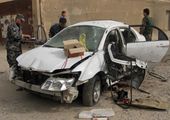
Iraq Violence_Lea.jpg
Iraqi security forces inspect a damaged car at a bombing site in Baghdad on Monday, Oct. 4. 2010. Police say the roadside bombing targeted the convoy of a deputy minister in Iraq's government, killing the minister's bodyguard and injuring at least seven people. (AP Photo/Hadi Mizban)

Mideast Israel Palest_Lea.jpg
A Palestinian child holds a charred Koran inside a mosque in the West Bank village of Beit Fajjar, near Bethlehem, on Monday, Oct. 4, 2010, after arsonists, scrawling "Revenge" on a wall in Hebrew, torched the mosque. The blaze threatens to stoke new tensions over deadlocked Mideast peacemaking. (AP Photo/Bernat Armangue)

Pakistan_Thir.jpg
Pakistani fire fighters struggle to extinguish burning oil tankers after militants attacked a terminal in Rawalpindi, Pakistan, early Monday, Oct. 4, 2010. Police say suspected militants have attacked and set on fire at least 20 oil tankers in Pakistan that were en route to NATO and US troops in Afghanistan. (AP Photo/Anjum Naveed)
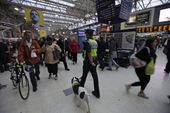
Britain Terror Threat_Lea.jpg
A police officer with a dog patrols a central London train station on Monday, Oct. 4, 2010. Britain's Foreign Office has upgraded its travel advice for France and Germany, warning Britons going to those countries that the threat of terrorism there is high. British Home Secretary Theresa May said that the threat of terrorism in the United Kingdom remains unchanged at "severe," meaning an attack is highly likely. (AP Photo/Lefteris Pitarakis)

Philippines_Protest.sff.jpg
A policeman talks to supporters of Carlos Celdran as they display their placards during a rally in front of the police precinct Friday, Oct. 1, 2010 in Manila, Philippines. Celdran was arrested after he disrupted a mass in protest to the church opposition to the promotion of artificial birth control methods. (AP Photo/Pat Roque)

20101003-205736-pic-644227287.jpg
Congolese soldiers sit in the back of a truck en route to their post in Walikale, Congo. The Congolese government welcomed a new U.N. report's suggestion that a tribunal be set up to prosecute those responsible for mass killings between 1993 and 2003. (Associated Press)
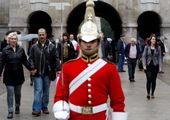
20101003-204729-pic-546935609.jpg
Tourists visit the Horse Guards Parade in London on Sunday. The U.S. government has warned citizens to be vigilant while traveling in Europe because of the threat of al Qaeda commando-style attacks. But the alert is not as strong as a warning, a State Department spokesman said. (Associated Press)


